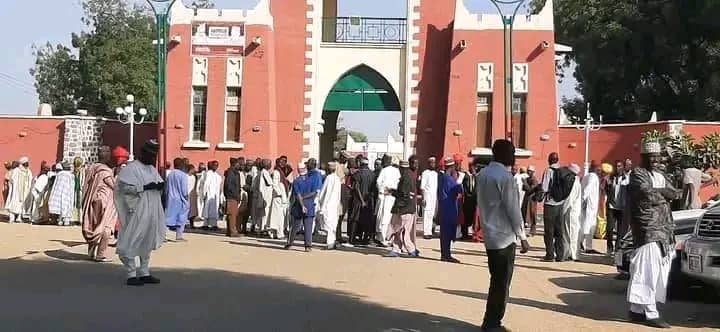
The Kano State Government has accused the Federal Government of orchestrating the blockade of the Kano Emir’s Palace on Friday, an incident that heightened tension in the state.
Armed police officers and Department of State Services (DSS) operatives sealed off the palace entrance while Emir Muhammadu Sanusi II was presiding over a court session in the outer palace.
Despite the disruption, the emir later led the Friday congregational prayer at the Kano Central Mosque, located outside the palace.
The emir was reportedly scheduled to address economists on the ongoing debates around the proposed tax reform bills before the National Assembly.
He was also set to accompany Munir Sanusi, his newly appointed district head, to Bichi.
The Secretary to the Kano State Government, Abdullahi Baffa Bichi, criticized the Federal Government’s involvement, describing the incident as an unnecessary provocation.
Speaking on a local radio program, Bichi condemned the blockade, asserting that it was part of an agenda to disrupt Kano’s peace.
“We woke up to this shocking development of armed security operatives sealing off the entrance to the palace of Emir Muhammadu Sanusi II. This is despite the fact that Kano is peaceful. However, a few individuals, with backing from Abuja, seem intent on creating instability,” Bichi said.
He added, “The emir was to escort the district head of Bichi, Wamban Kano, pray with him, and return. This was a peaceful, scheduled activity. We asked for the reason behind the blockade, and the security personnel claimed it was an order from above—clearly, the Federal Government.”
Bichi reassured Kano residents of the state government’s commitment to peace, stating, “We have resolved to maintain peace in Kano. No one, regardless of their influence, will destabilize our state. The emir’s decision stands, and when he is ready to proceed with the district head’s installation, we will accompany him without hesitation.”
The incident has sparked widespread criticism, with many questioning the Federal Government’s role in the matter. The blockade is seen as part of a broader tension between the state and federal authorities.


